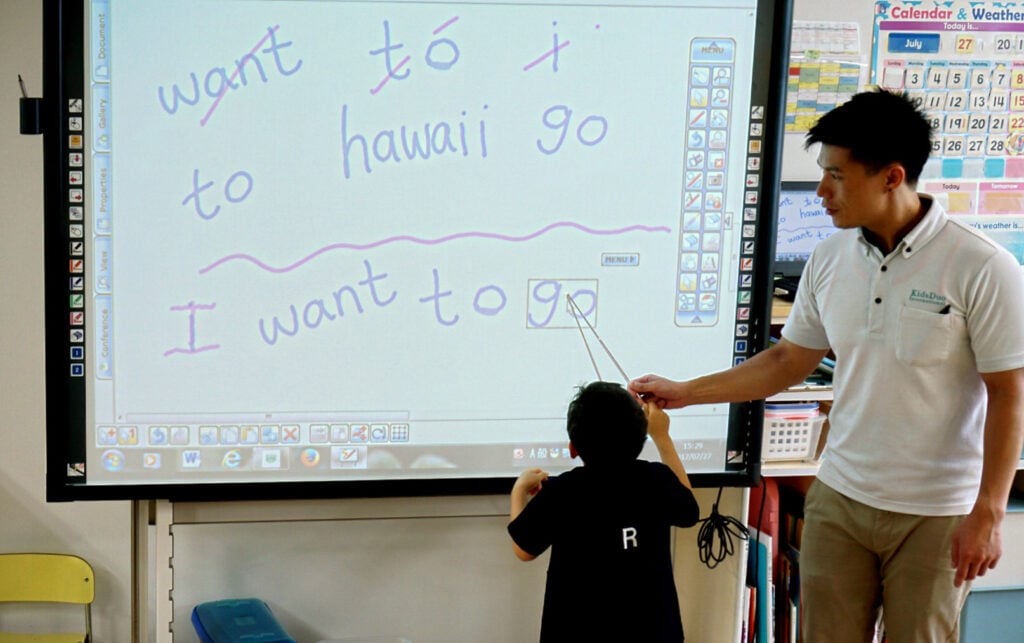Teaching English in Japan is often seen as a way to live and work in Japan without necessarily knowing a lot of Japanese. But actually knowing the language will dramatically improve your quality of life in Japan, as well as improve your chances of developing your teaching career, including helping you land jobs at universities or be promoted at your English language institute or school.
So should you, even after putting in the hard work to learn Japanese at a language school, work as an English teacher in Japan?
The basics of teaching English in Japan
Firstly, there is a large demand for English teachers in Japan. Visit any job boards that target foreigners and there’s a good bet that the vast majority of roles advertised will be for English teachers.
The main ways foreigners end up teaching English in Japan are through; a teaching program (such as the JET program), through an English teacher recruitment company or through the individual school/company itself.
Depending on which route you go and your qualifications and experience, you could be assisting an English teacher at a public elementary school, playing fun English-language games with preschoolers, managing your own private English classes for adults or teaching English to university students.
The quality of your job and your salary, as well as career development opportunities, depend on a number of factors such as your education and also your Japanese language ability.
Note that some teaching positions are not your typical Monday to Friday roles and may require teaching on weekends, public holidays and outside standard work hours.

Why teach English in Japan?
For those looking for a stable way to live and work in Japan, teaching English is a good option. The work is consistent, it can be very well-paid depending on the role and good employers will sponsor your work visa. Not to mention the rewarding experience of helping people learn and develop their English language skills.
Note, though, that the usual requirements for work visas still apply i.e. you must have a university degree and/or several years of experience in a particular area of work. Without that, it is basically impossible to get a work visa application approved by immigration.
Do you need Japanese to be an English teacher in Japan?
If your goal is to level up your teaching career in Japan, then knowing Japanese can go a long way. Being able to communicate in Japanese will pave the way for you to take on more advanced teaching roles, such as teaching English at universities or stepping into a management role for an English-teaching company.
Knowing Japanese is also crucial to living a fulfilling life in Japan.
Teachers who work in public or private schools are often the only English teacher, or one of only a small number of English teachers, in a team of Japanese staff. Not only will you be able to communicate and connect with your colleagues if you know Japanese, but those long meetings held in Japanese will be considerably more interesting when you can understand what’s going on!
Being able to communicate in Japanese in a work setting, in general, is extremely helpful and will go a long way towards building strong working relationships with colleagues and superiors, which is an important aspect of work-life in Japan.
Outside of work, you will need Japanese for daily life, such as completing ward office procedures, visiting the doctor or hospital when sick, ordering at restaurants and cafes, sending post, visiting the bank, getting a haircut – and the list goes on. After all, there still aren’t a lot of people in Japan who can speak English – something you’re looking to change!
It is a much easier and more fulfilling life when you can communicate in the local language.

Help pave the way to a brighter future for Japanese kids with Yaruki Switch
Yaruki Switch is an education group that offers a range of English language programs for students.
Working primarily with children, English teachers with YARUKI Switch are offered a competitive salary, career advancement opportunities, visa sponsorship and public holidays off in addition to paid vacation days.
Teaching positions currently available!
Yaruki Switch is currently looking for candidates to teach energetic English classes and create new ways to engage students.
Each day instructors strive to provide a high level of educational programs, which are supported by a strong curriculum foundation to ensure that students are best prepared for their future schooling in the challenging Japanese education system.
No one day is the same and you can expect to cover a broad variety of English subjects such as Reading & Writing, Phonics, Songs & Chants, Arts & Crafts and more, using different lesson topics and styles to engage students and help them to learn through different mediums.
Teachers are actively encouraged to grow and expand on the set curriculum to create truly unique lessons for their students.
Applicants should enjoy working with children and be ready to teach students of all ages. Applicants must be self-motivated and eager to take on new challenges, such as helping to organise and execute events such as spelling bees and speech contests. Previous teaching experience and Japanese language skills can be an asset but aren’t necessary as full training is provided.
Applicants must:
- Have at least a two-year Associate’s Degree or higher, OR have a valid work visa (spousal, working holiday, etc)
- Be a native English speaker, or deemed competent in verbal and written English
- Be a team-player
- Commit to the position for at least one year
If you’re coming to the end of your language studies, you’re looking for a full-time job opportunity and you love teaching, Yaruki Switch could be the answer for you.
*This post is in Partnership with Yaruki Switch*
Apply now link – https://gogonihon.com/en/yaruki-switch-job-applications/
For more insight on living and working in Japan, make sure to follow our blog.












